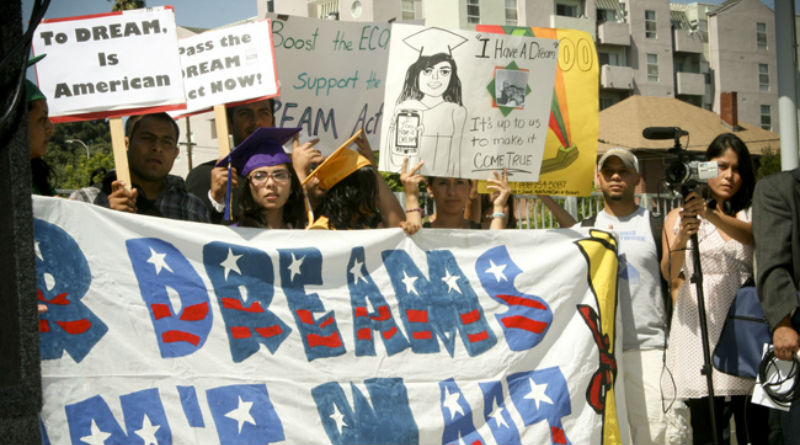
Deferred Action for Childhood Arrivals
News & Politics, Political-Opinion July 22, 2015By Edgar Arellano
Recently, there was a flurry of excitement at St. Petersburg College. Students flocked to the admissions offices to register, seek academic advisement, and apply for financial aid. Most left content knowing they were well on their way to start classes in August.
America is renowned for providing higher education to those willing to put in the work. However, this has not been true for everyone. In recent years, the media has sensationalized the so-called “Dreamers”, a group of students rallying for the right to stay in the United States legally. The “Dreamers” were brought to the United States illegally by their parents at a young age. Most have no recollection of leaving their natal home country where the majority are economically disadvantaged under an unstable government. Their parents’ decision to immigrate put these students in a predicament, hindering their educational endeavors. In most cases, with no social security number, drivers license or other means of identification, they are invisible. Even with an immigration application underway, the process can take several years to be approved.
Thanks to President Barack Obama, these “Dreamers” now have the freedom to pursue higher education and other benefits. Despite vehement opposition from Congress, President Obama implemented executive action known as the Deferred Action for Childhood Arrivals, the Dream Act, or DACA. This policy provides students an avenue to stay in the country legally, obtain a drivers license, and a social security number. More importantly, pending orders for deportation are deferred for up to two years, allowing families to stay united.
The Obama administration is infamous for carrying out the most deportations of any presidency. Imagine being raised in a country and one day being deported to another country, one that you know very little about. For many that is unimaginable and difficult to comprehend. Can you imagine what that would be like? This question was posed recently to Erasmo Mata, a “Dreamer”. Erasmo stood pensive before answering when asked what he would do. “I would have to come back to the States. Living in Mexico wouldn’t be an option for me. I’ve made my life here in Florida and because of DACA I have a good job.” About his future he said, “I would want my kids to be born in the United States for a better life.” Currently, Erasmo works at a high-end barbershop. He tirelessly cuts hair for a large clientele base. With each haircut, he is one step closer to becoming an entrepreneur and opening his own barbershop, making his American Dream a reality.
Before DACA, when students graduated from high school, they were at a standstill. This is no longer an impediment. Clisseria Padilla is another “Dreamer”. She was five years old when her family emigrated from Aguascalientes, Mexico. As a young student, she knew the importance of excelling in school. Her parents routinely stressed to her, “You have to be the best in school.” She took their advice. “I took Advanced Placement classes, and I was in the gifted program.” While she was “bitter in the beginning” about her parent’s decision to relocate to Florida, she came to appreciate the decision. “I understood where my parents were coming from wanting to give me a better life.” Clisseria is unstoppable. She recently graduated as an EMT (emergency medical technician), and in January she will start a fire science program and thereafter will enroll in a Paramedic program.
In a competitive economic and interconnected world, American society would benefit from having educated citizens and viable contributors to the American economy. Contributors like Erasmo and Clisseria provide services to the community. There is much discord in the government as to granting the “Dreamers” these benefits. A strong opponent to this policy is Florida Senator Marco Rubio R-FLA; recently he wrote a letter to President Obama and stated, “Your decision in 2012 to institute the Deferred Action for Childhood Arrivals (DACA) Program was a major impediment to passage of the kind of immigration reform our nation needs. No matter what we tried to do to institute meaningful enforcement measures in the Senate bill, opponents pointed to DACA as evidence of your unwillingness to enforce the law.” Senator Rubio has repeatedly called for an end to DACA. This would revoke the legal status given to hundreds of thousands of “Dreamers”. But not all in the GOP are against deferred action. Will Weatherford, speaker of the house in Florida recently stated, “The federal government requires us to educate all children in the State of Florida, regardless of their immigration status.” He went on to say, “But when some of those children get to college, we pretend they are no longer Floridians.” The statement Will Weatherford makes begs the question: Are these students being treated unequally for a decision they had no control over?
So the next time you are in the admissions office and notice the excitement, pay attention to those students who take advantage of their unalienable right to be educated. Fortunately, the “Dreamers” now have the chance to exercise this basic right, too.
Photograph by Antonio R. Villaraigosa (Flickr Creative Commons)
Originally published November 12, 2014.





